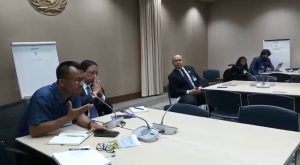Bangkok, Thailand – Resources allocated for development should be used effectively to achieve internationally-agreed sustainable development goals (SDGs). This was the message that members of the CSO Partnership for Development Effectiveness (CPDE) echoed loud and clear during their self-organized side event at the Asia Pacific People’s Forum on Sustainable Development (APPFSD).
These resources (called Official Development Assistance (ODA) or simply ‘aid’ allocated by governments for poverty eradication in developing countries) will only fulfil its purpose if used based on development effectiveness principles. A number of realities however have been hampering this and CSOs call for urgent overcoming of these challenges.
Emily Davis of the Asia-Pacific Development Effectiveness Facility (APDEF) acknowledged that “ODA as a financing flow is shrinking at country level but still plays an important role in financing the SDGs – though it may be smaller compared to other sources for financing such as domestic public and private resources, and remittances. In some countries it is a small slice of the pie but in small island developing states, least developed countries and the Pacific, it plays a large role. Since the SDGs need huge amounts of financing to achieve, governments are looking towards strengthening their financing frameworks and mechanisms for collaboration with the private sector to increase resources.”
Atama Katama of the Borneo Dayak Forum and also the CPDE Asia Focal point quoted The Reality of Aid 2018 Report: “It is a moral, if not legal, obligation to allocate aid at the level of the longstanding ODA target of 0.7% of providers’ Gross National Income.” Atama also raised concerns on how ODA is increasingly being used to attract the private sector to invest in development and directly finance their initiatives, and to militarize development. Expounding on militarization of development, Atama shared on the situation of West Papua, wherein military personnel are building ODA-funded infrastructure.
Urantsooj Gombusuren of the Center for Human Rights and Development-Mongolia shed light on how ODA is being used to fund resource grabs by corporations through mining projects. “These projects worsen inequality and poverty in Mongolia because mining brings revenues only to a few corporations and their executives, and pollution and environmental destruction to entire communities.” She added that “institutions are weak in Mongolia and civil society are not part of decision-making on how to use ODA.”
Jiten Yumnam backs this up with their own experience in Northeast India. He narrated how ODA-funded projects likewise contribute to land and water grabs and false solutions to climate change. “Dams are being built purportedly as solutions to climate change. But what they do is grab indigenous people’s territories and resources.” These projects also lack transparency and accountability. “Free prior and informed consent is hardly obtained prior to project implementation.” He added that “ODA is being used by Japan to promote its interests in the contiguous areas of Bangladesh, Myanmar, and Northeast India, to counter China’s influence in the same area.”
Speakers and participants agreed that in order to contribute to the realization of the SDGs and to lessening inequality, exclusion, and disempowerment, the use of ODA must follow the principles of development effectiveness principles: democratic country ownership of national development priorities, focus on results, transparency, and accountability. This means that the people of developing countries are fully informed of and are the main decision-makers in the policies, programming, actual usage, monitoring and evaluation of ODA; that ODA is not just efficiently being delivered but actually brings about development; and that governments are accountable to the people.
The side event titled “Making the SDGs Happen in Asia Pacific: Exploring the Development Effectiveness of ODA People’s Empowerment, Inclusion, and Equality in the Region” was organized by CPDE members The Reality of Aid Network, Borneo Dayak Forum, Center for Human Rights and Development, and Center for Research and Advocacy Manipur organized the workshop on March 25 ahead of the UNESCAP-organized Asia Pacific Forum for Sustainable Development.

